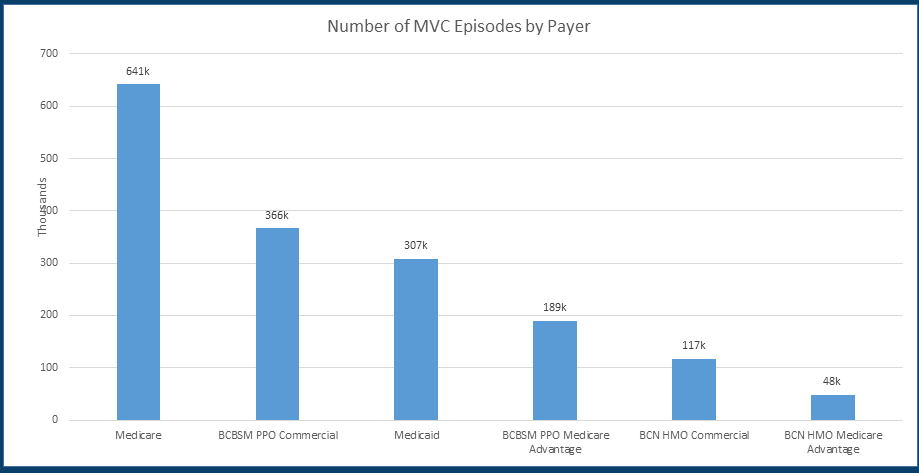The Michigan Value Collaborative (MVC) Coordinating Center recently added Medicaid data to its registry. This update reflects the culmination of many months of work to acquire, process, clean, and add the data, which became available on July 16 to MVC registry users. The current data set is from 1/1/15 through 9/30/19, which amounts to claims from 1/1/15 through 12/31/19. MVC data sources now comprise over 80% of Michigan’s insured population. This represents an additional 1.8 million covered lives (see Figure 1). MVC’s data sources now include Medicare FFS, Commercial Blue Cross Blue Shield of Michigan (BCBSM) PPO, Medicare Advantage BCBSM PPO, Commercial Blue Care Network (BCN) HMO, Medicare Advantage BCN, and Michigan Medicaid.
Figure 1.

The addition of Medicaid data will impact, among other things, the distribution of MVC episodes across its portfolio of payers. Medicare is still the dominant payer within MVC data with more than 641,747 episodes. However, the new distribution of MVC episodes by payer (Figure 2) showcases that Medicaid is now the third-largest payer in MVC data, accounting for 18% of total episodes.
Figure 2.

MVC currently serves 97 participating hospitals, including critical access members, and 40 physician organizations in Michigan. The proportion of Medicaid episodes in MVC data by facility (Figure 3) varies significantly across MVC’s membership, with some members attributing less than 5% of their episodes to Medicaid and some near 60%. For the bulk of MVC’s membership, between 10% and 30% of their episodes are in Medicaid, which represents a significant increase in the total episodes they can now utilize. For some MVC hospitals, the number of episodes they have in MVC data may double if they have a large share of Medicaid patients.
Figure 3.

MVC currently provides data on 40 defined conditions. The addition of Medicaid data is likely to impact certain conditions more than others in keeping with the types of procedures and conditions most prevalent with Medicaid-eligible populations. The top five Medicaid conditions include sepsis, C-section, vaginal delivery, cholecystectomy, and chronic obstructive pulmonary disease (COPD), so members are more likely to see changes to their utilization data for those conditions. The number of episodes being added for each condition is outlined in Figure 4.
Figure 4.

The Medicaid data will also allow for the creation of new data visualizations and reports that capture information not previously available. For example, MVC analysts recently generated two new Medicaid-based maps (Figures 5 and 6) that help visualize utilization and location information for the Medicaid population. Figure 5 represents the patient Zip codes that can be attributed to Medicaid episodes in MVC data, with Zip codes appearing darker if a larger percentage of Medicaid patients reside there. This allows members to see those communities near their own facilities that are likely home to the Medicaid patients they serve.
Figure 6 also represents the percentage of episodes attributed to Medicaid patients, with darker colors representative of higher percentages; however, Figure 6 connects these Medicaid episodes to MVC member facilities rather than Zip codes and visualizes the total number of episodes in addition to the percentage. Together, these two figures provide MVC members with more information about their Medicaid populations as well as the extent to which utilization varies between peer facilities in the same region.
Figure 5.

Figure 6.

These maps are the first example of new outputs that are possible with the addition of Medicaid data. The MVC Coordinating Center plans to produce additional reports for members that leverage the new data set. One area of interest is the social determinants of health. Since Medicaid provides medical assistance to disabled and low-income individuals, statistical analysis using this data often reflects trends tied to low socioeconomic status populations. Ideally, this data set will allow MVC and its members to invest more attention and resources into equity-based quality improvement projects.
The MVC Coordinating Center is eager to learn which topics are of greatest interest to members that integrate Medicaid claims. If your team has specific ideas that could help guide this work, please contact MVC at michiganvaluecollaborative@gmail.com.